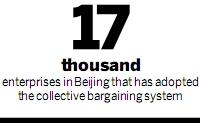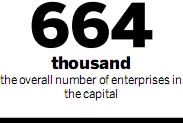Workplace bargaining revamp could give workers room to negotiate, carefully
Dozens of businesses in Beijing have been selected to take part in a collective bargaining test intended to establish more reasonable wage standards for workers and try to resolve long-existing problems with instituting a platform for negotiation between employers and employees.
About 60 companies located in all of the capital's 18 districts and counties are participating in the study. The companies are small-to medium-sized and come from industries, including security, and housekeeping, said Huang Wei, director of the labor rights department of the Beijing Municipal Federation of Trade Unions, which is overseeing the research.
"The key problems of a collective bargaining system is to balance the rights of employees and profits of employers," Huang said. "We are building up the industry wage standard to give bargaining criteria to both sides."
Collective bargaining is a process of negotiation between workers and managers to determine wages and conditions. During the bargaining process, workers are typically represented by a trade union that negotiates with employers.
Feng Tongqing, a professor with China Institute of Industrial Relations, said collective bargaining should be implemented with caution.
"The system can pose a risk for society," Feng told China Daily.
He said societal unrest could emerge if wage increases are distributed unequally between different trade unions, resulting in some workers earning more while others do not. Industry wage standards would adjust income gaps and reduce labor disputes, Feng said.
However in Beijing, according to Feng, the income gap is mainly between monopoly enterprises and small-sized enterprises.
"Besides bargaining with employees, trade unions also need to help employers bargain with monopoly enterprises," he said.

Since 2007, the wage standard on Guijie, a street in Dongcheng district famous for its many restaurants, has been fixed. More than 90 restaurants on the street signed wage contracts to adopt the minimum salary in the area.

The minimum wage standard in Beijing will be raised to 960 yuan per month, which means it will increase to 1010 yuan per month on Guijie after July 1.
While a collective bargaining system has been in place in Beijing since 1996, it has lacked widespread implementation. Over the past 14 years, only 17,000 enterprises successfully adopted the system.
"The number is not satisfying," Huang said. "One of the main difficulties is from employers who still think they have the ultimate decision-making power over workers' wages and that it will add human resource costs to raise wages."

Although collective bargaining was established in China in 1995 when labor laws were put into effect, Huang said there are no strict rules forcing companies to adopt such a system and many companies do their best to delay or avoid implementing one at all.
"If employers do not want to accept the collective bargaining system, we do not have any solutions," Huang said. "Employers attitude towards the system largely determines the whole process."
Some companies say they do not object to collective bargaining.
"Collective bargaining can bring long-term benefits to companies," Susan Hu, a human resource manager with a foreign public relations firm in Beijing, said.
Employers would see lower turnover rates if workers' wages were based on negotiations, Hu said. Yet she said even after negotiations, companies will still ultimately set the wages.
"To accept collective bargaining is also a challenge to trade unions," Huang said. "Trade unions need to improve our capabilities to protect employees' rights."
Liu Yuanwen, deputy dean of the trade union department with China Institute of Industrial Relations, said the concept of trade union is not one that is well understood yet in the country.
"There is a lagging perception that it is about negotiations rather than bargaining in the domestic context," Liu said.





